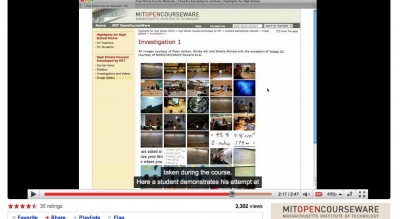
I’ve been thinking of the future of higher education with the advent of Web 2.0 for some time now. Will new technologies be a “game changer” for colleges and universities and what are the stakes? Currently, there is the issue of legitimacy that accredited schools and programs afford to both students and employers, taking a narrow and pragmatic view of higher education, and web 2.0 education alters the higher education business model. While costs are reduced, particularly with the use of online adjuncts, there are questions of quality. Technologically-mediated instruction still needs to be refined so it affords the same educational experience of face-to-face instruction. I’m interested in the specifics of this, with respect to the use of newer video codecs and interfaces that foster engagement, as well as the use of both synchronous and asynchronous modes of instruction and interactivity.
Online lectures are interesting, as they reduce education to digitized content. The instructor, lecturer, and professor are in the same boat as the photographer, music artist, film producer, and journalist. The digitization of what drives value allows it to be readily obtained, retransmitted, repurposed, remixed, etc. The Chronicle of Higher Education has a recent piece on whether or not lectures should be online. Most of the article focuses on what I see as side issues, but this hits on what I think is one of the key points::
“And lectures might just fall out of popular use in physical classrooms, because professors could just point to their past recordings or those of others and assign viewings for homework. To keep students interested in the classroom, some professors would focus more on discussion or group projects and things that can’t be easily captured on video.”
I think moving away from the “canned lecture” rehashing the text is a good thing. Way back when I was an undergraduate, back when dinosaurs roamed and PC meant pre-Cambrian, the best courses were those which built upon the readings, not parrot them. Fast forward a few years when I taught my own “preps” at the University of Oregon. I felt that my teaching was at its best when there was limited lecturing and more discussion of the material and the derivation of knowledge, particularly with the use of cases, articles, or blog posts by myself or students. Sometimes, I felt that being a good talk show host was what I was striving for.
I feel for what I teach, marketing, strategy, methods, economic sociology, consumer behaviour, etc., the lecture isn’t the true value added. It’s the moderated discussion afterwards, face-to-face and online, synchronously and {to a lesser extent} asynchronously. Web 2.0 can help universities rethink curricula, in terms of::
- What is optimally offered online given current technologies?
- How to address courses with different types of content/knowledge?
- How can courses be tailored towards students with different learning styles/abilities?
An old boss of mine scoffed at students claiming “alternative learning styles”, using quotation fingers, but over the years I’ve seen students who flounder in other classes come alive with thoughts and ideas just by allowing them to use different modes of expression, both online and face-to-face. While the Chronicle of Higher Education ponders issues of intellectual property, copyright, and even professors subject to ridicule, the weightier issue is how will universities offer courses, certificate programmes, and degrees in the context of lifelong learning that deliver value for its students and other stakeholders?
Future posts of mine will examine issues of Research 2.0 and a possible future for technologically savvy professors that understand how Web 2.0 and beyond can leverage efficiencies in teaching, move towards better learning outcomes, and foster a research agenda. Is this pandora or panacea?
Twitterversion:: Blog on the professor’s role as teacher w/advent of Web 2.0. Will digital content kill the teaching stars? #ThickCulture @Prof_K
Song:: Belle & Sebastian-“Family Tree”

Comments